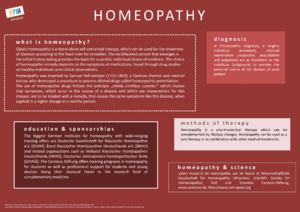Homeopathy

Homeopathy is a medical approach mainly founded by Samuel Hahnemann. A basic principle is a pharmaceutical process of repetitive steps of diluting and mixing called potentization. The name homeopathy comes from the approach of similarity (greek ὁμοῖος homóios, english similar and πάθος páthos, english suffering). In latin this is called similia similibus curentur translatin to "like cures like".[1] The underlying theory is that if a substances causes certain symptoms it will be a remedy for a disease with similar symptoms.
Potentization
A substance gets diluted with a neutral carrier substance. The latter can be water or sometimes milk sugar. The relations are usually 1:10 (D), 1:100 (C) or 1:50000 (LM). The diluting is followed by a step of mixing. This can be "succussion" (shaking)[2], hammering the vial on a soft surface or another process depending on the branch of homeopathy or the degree of dilution or the diluent. The process gets repeated multiple times leading to continuing dilution of the original substance. The process is sometimes called dynamisation.
The resulting solution is most commonly applied to a sucrose pill (globuli) and administered sublingually.[2]
At a certain degree of dilution it gets less and less probable that a single molecule of the original substance could be found in the remedy. This is a major point of criticism as the usual pharmaceutical model is based on molecular interaction.
References
- ↑ Hahnemann, Samuel (1833). The homœopathic medical doctrine, or "Organon of the healing art". Dublin: W. F. Wakeman. pp. iii, 48–49.
Observation, reflection, and experience have unfolded to me that the best and true method of cure is founded on the principle, similia similibus curentur. To cure in a mild, prompt, safe, and durable manner, it is necessary to choose in each case a medicine that will excite an affection similar to that against which it is employed.
Translator: Charles H. Devrient, Esq. cited from "Homeopathy". Wikipedia. Retrieved 11 November 2021. - ↑ 2.0 2.1 "Homeopathy". UpToDate. Retrieved 11 November 2021.